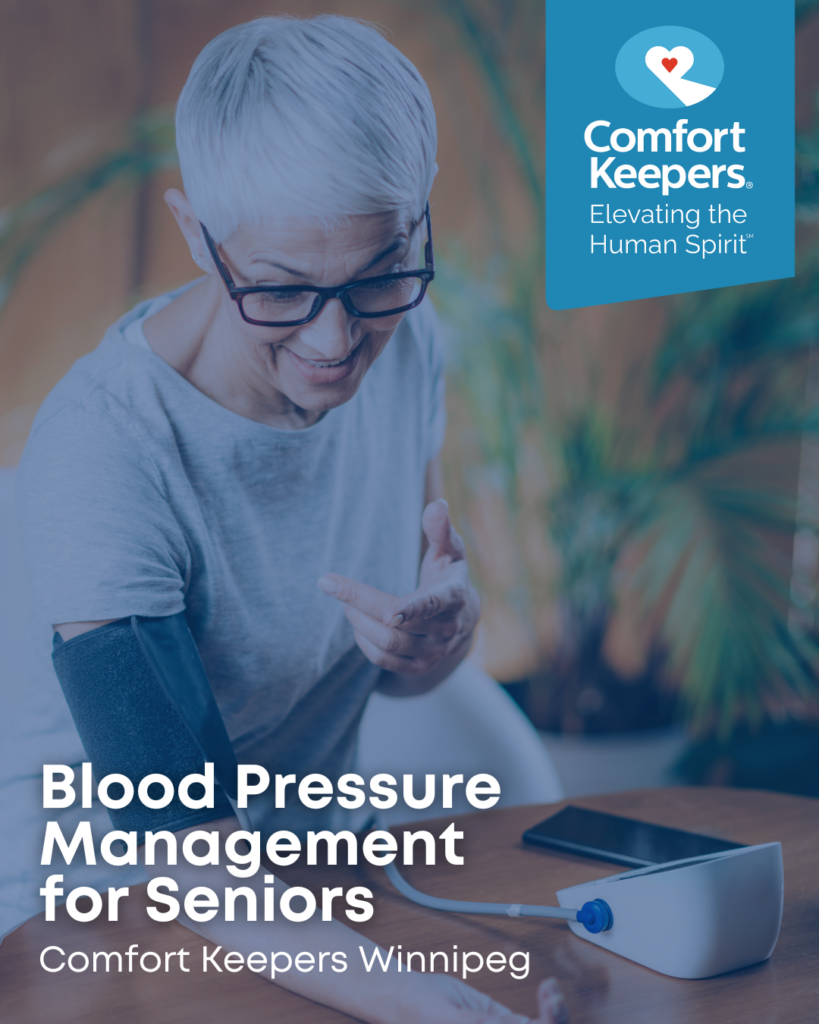Blood Pressure Management for Seniors
Health | October 16, 2020

What Every Senior in Winnipeg, MB Needs to Know About Managing Their Blood Pressure
What do you need to know about blood pressure management for seniors? Blood pressure can increase for those of any age, but adults aged 65 and older tend to be at greater risk of high blood pressure because of structural changes to the arteries.
Fortunately, education around blood pressure seems to be making an impact; the Centers for Disease Control and Prevention (CDC) notes that there has been a gradual increase in the number of older adults who have received treatment for high blood pressure since 1999.
The key to managing high blood pressure for these individuals was having their blood pressure checked frequently. But what exactly constitutes normal blood pressure for seniors?
Seniors and Blood Pressure: The Silent Killer
53% of Canadians aged 60 to 79 have high blood pressure (or hypertension). It’s especially concerning considering that high blood pressure contributes significantly to the risk of health conditions that thousands face each year, such as heart attack, stroke, chronic heart failure, and kidney disease. And because those with high blood pressure tend not to have any symptoms, the disease is often referred to as the ‘silent killer.’
What Is Considered Normal Blood Pressure?
High blood pressure was, for many years, treated at 140/90mm Hg, but just last year, the American College of Cardiology (ACC) released new guidelines that consider 130/80 to be high. While these new guidelines were put in place to help treat high blood pressure earlier, some in the medical community feel that it may be harder to apply directly to seniors, who, as mentioned, already have higher blood pressure levels than younger adults.
Treating the matter as black and white may not be realistic. For instance, lowering a senior’s blood pressure, when unnecessary, can dramatically increase a senior’s risk of falling. Conversely, one study showed that frail seniors may benefit from a slightly higher blood pressure level to help facilitate constant blood flow.
By ACC standards, blood pressure lower than 120/80 is still considered ideal, but physicians should consider all aspects of a senior’s well-being before setting out to reach this goal. Cardiovascular health is an extraordinarily important part of our overall health, but it should not be managed in a silo. Seniors should discuss the subject of their blood pressure thoroughly with a physician, keeping in mind any existing conditions and current medications.
Comprehensive discussion will help lead to a better plan for either reducing the risk of high blood pressure or management of existing high blood pressure.
Managing Blood Pressure for Seniors
All seniors should obtain a blood pressure monitor for their home so that they can self-check. It’s recommended that several readings, across the span of about one week, are averaged in order to get a higher level of blood pressure accuracy. If blood pressure consistently stays high, medication may be required. However, there are a number of lifestyle choices seniors can make to help reduce their risk of high blood pressure, all of which should be done with physician approval.
- Follow a balanced, heart-healthy diet, complete with fruits and vegetables, high-fiber foods, whole grains, low-fat dairy products, and nuts
- Maintain a healthy weight
- Get some form of exercise every day for at least 30 minutes
- Do not salt your food and avoid processed foods whenever possible (especially if salt-sensitive)
- Follow a consistent sleep schedule
- Limit alcohol consumption (no more than one beverage a day for women, and two for men)
- Don’t smoke, or take steps to quit
Comfort Keepers® Winnipeg Offers a Wide Range of Private Home Senior Care Services
For families concerned about the health and well-being of aging loved ones, we can help with homecare services including, Alzheimer’s and dementia care, in-home personal care, respite care, specialized care, in-home nursing, end-of-life care, senior living transition services, and much more!
Comfort Keepers® professional caregivers provide services to ensure safety, health, and happiness without the stress of moving to an assisted living or rehabilitation facility. Individually tailored care plans account for living arrangements, medical issues, physical restrictions, personalities, expectations, and more.
Our Interactive Caregiving™ Approach Enables Top-Notch Homecare
The Interactive Caregiving™ provides a system of care that addresses safety, nutrition, mind, body, and activities of daily living (ADLs). Our compassionate caregivers can provide a personalized home care plan for your loved one, allowing them to enjoy a healthier, safer, and more meaningful retirement at home.
Comfort Keepers® is the Most Trusted Name in Senior Care in Winnipeg
Our in-home caregivers ensure our seniors are physically, socially, and mentally engaged. In addition, we provide options, activities, events, and resources for seniors that might otherwise not be available.
Locally Owned and Operated In-Home Personal Care for Seniors
Our caregivers live and work in the Winnipeg area. We know the area and how to assist our clients using local resources. Comfort Keepers® Winnipeg is here to help you and your loved ones get the best care possible. If you live in Winnipeg and require homecare services for senior personal care and wellbeing, contact Comfort Keepers® at (204)-488-4600.
Accredited Home Care for Seniors in Winnipeg
Comfort Keepers® Winnipeg is accredited with Exemplary Standing with Accreditation Canada. Accreditation is an intensive process in which industry experts examine an organization’s processes, policies, and procedures against quality standards. To achieve accredited status, Comfort Keepers® offices met or exceeded the rigorous standards for Home Care companies, as defined by Accreditation Canada.
References:
Statistics Canada. “Health Fact Sheets:Blood pressure of adults, 2012 to 2015.” Web. 2016.
AgingCare. “High Blood Pressure: Guidelines and Treatments for Seniors. Web. 2018.
Centers for Disease Control and Prevention. “High Blood Pressure Facts.” Web. 2018.
Better Health While Aging. “6 Steps to Better High Blood Pressure Treatment for Older Adults” by Leslie Kernisan, MD
MPH. Web. 2016.
American College of Cardiology. “New ACC/AHA High Blood Pressure Guidelines Lower Definition of Hypertension”
Web. 2017.
Harvard Health Publishing. “Blood pressure goals may need to change with age” by Howard LeWine, M.D Web. 2012.
National Institute on Aging. “High Blood Pressure.” Web. 2015.
Individualized Home Care Options
Long-Term Home Care, 24 Hour Home Care & Short Term Care Options Customized for You







